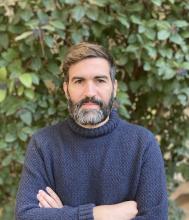Organoid-based manufacturing of biohybrid-implants for skeletal regeneration: towards living robots?

Περίληψη
In my talk i will provide an overview of our research activities in the development of cartilaginous organoids that can regenerate skeletal defects. Organoids enabled the recapitulation of robust biological processes encountered in developmental biology. This provides a revolutionary new way for engineering functional tissue implants moving from a trial & error approach to more mechanistic one enabling the incorporation of design principles. This will enable the development of semi-autonomous implants with preprogrammed functionalities. Hence the following question arise - can we engineer 3D living implants able to autonomously execute regenerative tasks & how can we control their fate?
Σύντομο Βιογραφικό Ομιλητή
Ioannis Papantoniou is an Associate Professor at the Tissue Engineering Lab of the Skeletal Biology and Engineering Research Centre Department of Development and Regeneration, Faculty of Medicine, KU Leuven. He is also member of Prometheus, the translational division of LR&D of KU Leuven. In addition he is also a visiting PI at the Institute of Chemical Engineering Sciences, Foundation of Research and Technology (FORTH) in Greece. He has been awarded an IKY scholarship for his doctoral studies at University College London (UCL), UK and an FWO postdoctoral award for his research tat KU Leuven, Belgium. His main research focus is develop designed 3D cell-based products with built-in arranged quality attributes through high-precision bioengineering technologies for skeletal regeneration.
He is an elected member of the council of the TERMIS-EU society and deputy chair of the TERMIS-EU communication committee. He is the scientific coordinator of the H2020 ‘Jointpromise’ project aiming at automating the biomanufacturing of organoid-based osteochondral implants and is also a participant and Board member of the H2020 project ‘AIDPATH’ aiming at the integration of Artificial Intelligence technologies in Cell Therapy Manufacturing. He has obtained funding from European (H2020, INTERREG), national (FWO, ELIDEK) and industrial sources and has coached several young researchers into obtaining personal Postdoc/PhD grants and scholarships.
